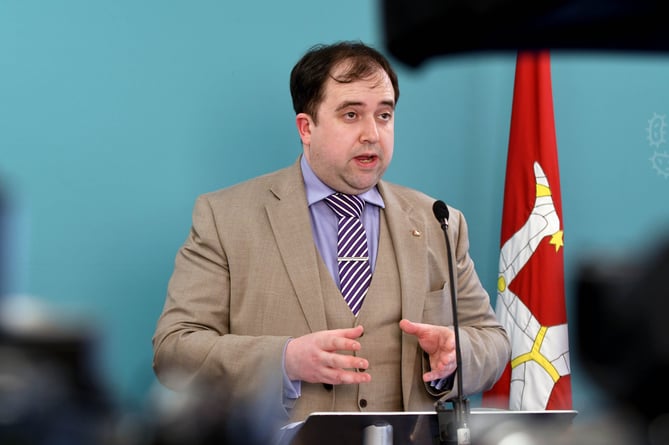An MHK says that those on patient transfer flights and on regular flights are treated in the same way, with little consideration given for their illness when flights are cancelled or delayed.
Douglas North MHK David Ashford explained that he is aware of an elderly constituent who believes the stress of travel disruption is worse than the disease they are suffering with.
He said: ‘What is being laid out is pretty much the same as what’s there for any standard passenger and the people we’re sending away are actually quite severely ill.
‘With some of the recent [flight] cancellations, cancer patients were left standing for over an hour.
‘There was a sick child with nowhere to sit, whose family felt abandoned because they couldn’t get any information out of the airline.
‘I’ve got an elderly constituent whose family is now having to convince them to go for their next round of treatment as the elderly constituent has been disrupted numerous times recently and now doesn’t want to have her treatment as she believes the stress of the travel disruption is worse than the disease.
‘Surely that shows there is a lack of support for those returning.’
He asked in the House of Keys if the health minister would speak to the Department of Infrastructure and the airlines about what is being provided.
Rushen MHK Michelle Haywood was answering on behalf of Health Minister Lawrie Hooper as he was absent.
She said: ‘Patients travelling should be considered as extra vulnerable and they do have additional needs.
‘All patients who receive a warrant to travel off island to appointments are given details of who to contact if they do need additional assistance.
‘There are also the quiet rooms at the Isle of Man and Liverpool airports.
‘Manx Breast Cancer Support Group have been liaising with the directors of the airports to improve the patient experience, particularly when patients are going through security and using assistance.’
When asked what support is provided to departing or returning patient transfer passengers whose flight is cancelled or delayed by more than two hours, Dr Haywood went over the procedure.
‘The Department of Infrastructure holds a contractual agreement with Loganair Limited for all patient transfer flights to the United Kingdom,’ she said.
‘Within the contract, there are provisions in place to support patients whenever there are substantial delays or flight cancellations.
‘This includes the provision of refreshments where the flight is delayed for more than two hours, the provision of alternative travel arrangements where significant delays are incurred, and the provision of overnight accommodation where the delay or cancellation means that alternative travel arrangements are made on a different day.
‘These arrangements must, as a minimum, comply with the flight compensation 2004 EU regulations and Loganair would be responsible for the support of patient transfer passengers where such a delay or cancellation arises.’
Mr Ashford also wanted to know from the infrastructure minister how many arriving and departing flights in the last month have been cancelled or delayed by more than two hours and in each instance what the reason was.
Chris Thomas said airlines experiences delays and cancellations for a ‘multitude of reasons’, for which the airport isn’t always informed of the cause.
From March 1 to 22, there were 622 scheduled flights, 10% of which were cancelled and seven percent delayed.
This could be down to the weather, airline operators cancelling, technical issues with the airline, and visibility issues.




